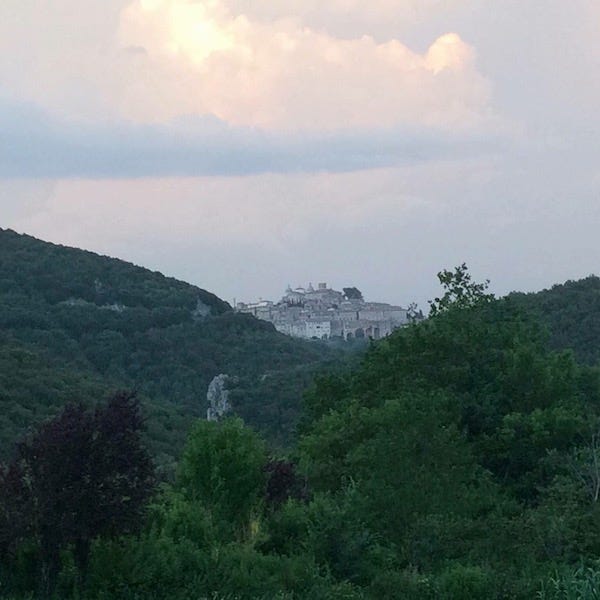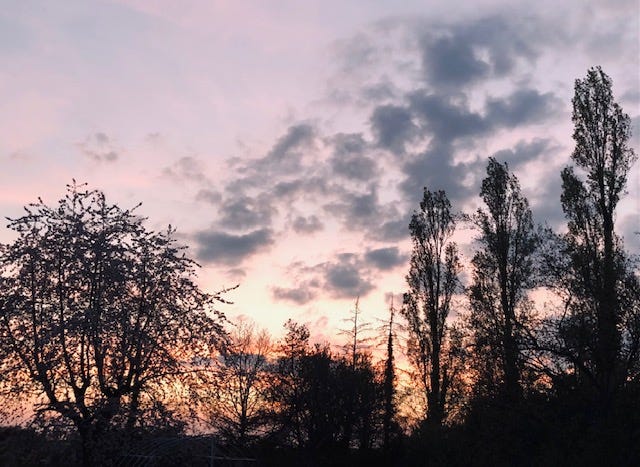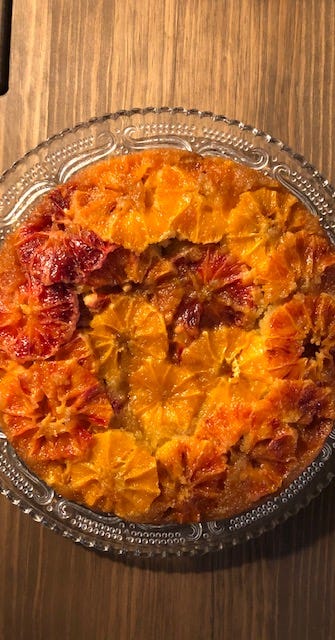The May newsletter is being published a bit early. There are several reasons for the advance. We are taking a short trip to Italy at the end of April and into the first week of May. Our grandson, Léo, has another two week school break and we thought we would use that opportunity to visit Italy—for the first time only for pleasure, not work. A trip en famille (as a family) to visit friends and enjoy the wonders of Rome and Umbria sounds like a perfect antidote to these last few weeks of winter malaise. We will also begin celebrating Jairo’s birthday while we’re there! We’ll keep you informed about the actual trip on social media.
The Spring Holiday (Easter, Passover, and this year, Ramadan, as well) has come and gone. The French word for Easter is Pâcques and I just learned that it is the same word for Passover. In French, however, the Christian holiday is plural, les Pâcques, and the Hebrew holiday is referred to in the singular and with an additional modifier: la Pâque juive. I found an interesting website for English teaching jobs in France that has a brief introduction to French Easter traditions and the derivation of the word Pâcques.
We actually spent most of the holiday in quarantine because we were “cas contact.” A delightful holiday weekend in the country at Jairo’s sister’s house was interrupted when Covid reared its ugly head. After driving for two hours through the excruciating Parisian holiday exodus, we arrived on Friday afternoon to the stunning beauty of vast, flat, fields of yellow, flowering, rapeseed, used in the production of canola oil. The image brought to mind the Ukraine flag and reminded us of the war continuing to rage in Eastern Europe. Kena, Léo and other family members were scheduled to join us on Saturday for an Easter lunch. We walked in the garden and wondered at the simultaneous setting of the sun and rising of the full moon, amidst the cherry and apple blossoms.
Later on Friday, right before dinner, Jairo’s sister learned that her son, his wife, and their baby had just tested positive for Covid. She had been in contact with them a few days previously and tested positive herself at the local pharmacy early Saturday morning. Everything was immediately cancelled. For breakfast, we sadly ate the delicious Orange Upside Down Cake (David Lebovitz’s recipe) that I had made for the Easter Saturday déjeuner and Jairo and I hightailed it back to Paris. On Monday, which was also a holiday here, we self-tested negative and right now we’re feeling fine. But this is the closest we have come to being in contact with the virus, and we were a little on edge for the last few days.
This might be a good time to talk about getting oriented to the French healthcare system. The famous French bureaucracy has been very kind to us up to this point. Knock on lots of wood. I already mentioned in a past blog how un-enrolling from Medicare Part B was one of the hardest things to do when we left the USA. I had only recently been diagnosed with type 2 diabetes and was nervous about changing healthcare systems. When we arrived to Paris in July, we had three months of “travel” insurance to cover us while we went through the process of enrolling in France’s national health insurance. Jairo holds a French passport and, because of Covid, the waiting period of three months had been waived for French citizens and their spouses returning to live in France. By mid-August, we had our appointment with the insurance office and had turned in, to the kind woman at the window, a small mountain of paperwork. Everything was in order except that our bank account did not show both of our names in full. We eventually got that fixed. Sort of. But that’s a banking story, not a healthcare story.
Two months after turning in the required forms, I received my temporary “social security” number. (Don’t ask me why you have to receive a temporary number before you can receive a permanent one. It’s just one of those things that makes life in France so endearing). One month later, I received the permanent number and the sacred Carte Vitale, the card that acts as a kind of credit card for all medical visits and pharmacy needs.
The Carte Vitale had attained a kind of mythic place in my imagination after having watched all seven seasons of the French television series, A French Village, during the first quarantine in Akron. In the final episode of this very sophisticated soap opera, one of the main characters, a resistance fighter, whom we had lived with through all of World War II and its aftermath, now an old man, was waiting in line at the national health insurance office, because his sickly wife had lost her Carte Vitale. This is the national health insurance that he and his Communist party comrades had helped create in the idealistic revision of the French republic after the war. The bureaucrat at the window refused to hear his pleas for help and kept repeating: “Without a Carte Vitale, there’s nothing I can do.” Needless to say, it was such a traumatic experience for our hero that he had a heart attack and died, neglected, on the office floor. Believe me, I know how important the Carte Vitale is. And I know not to lose it. No matter what.
By mid-November, I was ready to roll. I researched and selected a supplementary insurance (une mutuelle) that made me happy because it operated as a true mutual, a kind of non-profit, and was associated with the railroad workers union. The monthly cost of our mutuelle is less than what Jairo and I were paying for Medicare Part B in the USA. I located a primary doctor in an office a short walk from our apartment and lined up appointments with a cardiologist, a urologist, an ophthalmologist, a dermatologist, a podiatrist, and an osteopath.
Osteopathy was a revelation. My osteopath informed me that osteopathy is actually an American medical innovation, but it’s no longer practiced in the USA in its original form. Now American doctors trained as osteopaths are very similar to regular MDs. However, in France and elsewhere, osteopathy is a more holistic approach to healthcare that involves hands-on therapy techniques, musculoskeletal manipulation, and work on the nervous system, alignment, and unblocking energy centers. I find my osteopath sessions to be much less violent than chiropractic and the results are more like good massage therapy or acupuncture.
You can probably tell that there are very many differences between French and American healthcare. Walking under ancient arches to get to a dermatology appointment at Hôpital Saint-Louis, built over 400 years ago by King Henri IV, in the time of Molière, puts one in a frame of mind very distinct from wandering the art-filled hallways of the Cleveland Clinic’s Main Campus. You can’t always trust that the building’s directory is going to tell you how to locate your doctor’s office. There are rickety elevators and dark hallways, but they often lead to ultra-modern equipment and bright, young technicians and assistants. The patient is forced here to take a more active role in his or her own healthcare. You’re not going to get jolly postcards in the mail reminding you to make your dental appointment, for example. You have to keep your own files, including your prescriptions, test results, X-rays, and sonograms, and often provide them for your doctor. For the moment, we miss some of the relationships we established with our Akron-based health providers. We went to the same dentist for over thirty years. I’m not sure we will develop those same kind of relationships here in a big city like Paris. However, I find the French doctors less rushed than American doctors and much more willing to talk—even talk politics. I have had several lengthy discussions with my caregivers about Trump, cancel culture, Black Lives Matter, and other hot topics.
So far, I have no complaints. And, insurance-wise, France is a dream. (As long as Madame Le Pen is not elected President on Sunday). My medical and pharmacy expenses are covered 100 % because I have a chronic disease. The 100% means that I only pay if I choose care that is beyond the recommended cost. For example, my cardiologist and endocrinologist are both Tier 2 and charge more than the public doctors. So my supplemental insurance (mutuelle) covers a portion or all of the remainder and maybe I have to pay a small amount out of pocket. In general, it works a lot like Medicare. But medical visits, hospitalization, and drug costs are much less expensive than what one pays with American Medicare or any other US version of insurance. It’s tragic that so many Americans don’t realize the benefits of a single payer, Medicare for all, national health insurance. Maybe someday…
Jairo’s experience has been a little different. As a French citizen, it actually took him one month longer to get his Carte Vitale. Still much better than the nightmare stories we heard about people waiting for a year or more. We are both now fully insured and even have our European insurance cards for when we travel to another EU country. Other bureaucratic matters have gone fairly easily as well. We were both able to exchange our Ohio driver’s licenses for a French permis de conduire (valid for 15 years!). Jairo has obtained his carte d’identité (French identity card) and his carte d’électeur (voter registration) and I am in the final weeks of waiting for word to go and pick up my carte de séjour (like a French green card). It seems we are happily integrated into the French system.
With his carte d’électeur in hand, Jairo voted in the first stage of the French presidential election and he will walk next door to the elementary school to vote again this Sunday (April 24) in the second stage. Unfortunately, France’s left wing political parties are in disarray and refuse to collaborate with each other. The contest, therefore, is the same as it was five years ago, pitting centrist Emmanuel Macron, the current President, against right-wing zealot, Marine Le Pen. This great country’s democratic ideals of Liberté, Égalité, and Solidarité are dangerously under attack by the xenophobic, white supremacist tendencies that ooze their poison in repressive regimes around the world. The choice on the election ballot this weekend represents a moment of truth for the French people. Can they remain true to the post-war principles that have made their country one of the world’s great democratic experiments?
Vive la France!
P.S. We were visited this week by the lovely and talented Zoë Sapienza. Zoë worked as stage manager on the initial workshops of NWPL’s Goosetown: The Devil’s Milk, Part 2, by JT Buck. This week marks five years since the official opening of Goosetown, in April 2017, when we performed the entire trilogy at The Balch Street Theatre in Akron. JT and I are currently working on editing the scripts of the trilogy for future publication. And JT will be visiting us in Paris when we return from Italy! Is this a small world or what?











Once could feel the walls closing in just from your retelling of the bureaucratic journey. What a relief to make it thru the gauntlet, even if COVID is hot on your tail.
And how cool Zoe was able to visit! She looks vibrant!
Best of luck with preventing the ascent of Madame Defarge.
Rendez-vous de l'autre côté de l'Ombrie !